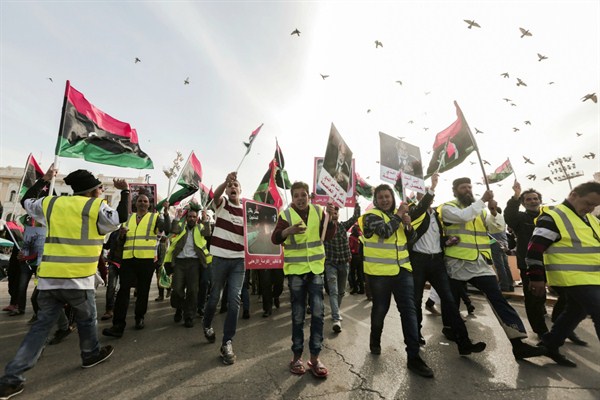When Khalifa Haftar, the leader of the self-declared Libyan National Army, released an audio message announcing his offensive on Libya’s capital, Tripoli, on April 4, he likely expected things to go very differently. Despite being the centerpiece of a United Nations political process that his international backers—primarily France, the United Arab Emirates and Egypt—had essentially hijacked to provide him a diplomatic route to uncontested power in Libya, Haftar used the assault on Tripoli to send a clear message that he rejected even the semblance of diplomacy and power-sharing. After all, it began on the same day that U.N. Secretary-General Antonio Guterres arrived in Tripoli to carry the political process over the line. Haftar believed he could blitz western Libya as he had done the country’s south, flipping a critical mass of local militias over to his breakaway army that first appeared in eastern Libya in 2014.
But too much pride and too little preparation often send plans awry, and Haftar’s offense was no different. His ominous announcement and dismissal of even a fig-leaf of a political process provoked a backlash across western Libya and meant that even those who had suggested a willingness to work with him found themselves feeling existentially threatened. Far from arriving to celebrations as his supporters suggested, Haftar was instead met with fierce resistance and the greatest mobilization of fighters Libya has seen since the 2011 revolution against Moammar Gadhafi. In addition to the politicians and militia fighters who feel their futures have been jeopardized, civilians who perceive Haftar to be a new dictator in the making—and who feel duty-bound to defend a revolution they have already shed blood for—are driving this resistance movement.
Almost a month later, little has changed. Although the war has escalated, the front lines have not shifted dramatically, and if anything, Haftar’s assault seems to be faltering. This was not the war that either he or his foreign backers had envisioned. With a treacherous supply line that snakes through more than 1,000 kilometers of harsh Libyan desert, and a limited amount of men in the west of the country who are willing to fight on his behalf, Haftar is being forced to rely increasingly on outside help to maintain his edge. This is a dangerous trajectory for Libya and forces the conflict onto a regional level. The more the UAE and Egypt get involved, the more it will attract opposing powers such as Turkey—and the more Libya risks becoming a Syria-style proxy-war at the center of the Mediterranean.

